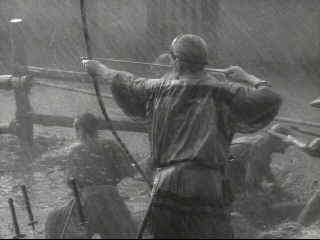Two Towers. As you may have noticed, I'm pleased to have
opened the Blithering Idiot to my daughter, Joy, age 13. I think I have to disagree with her slightly on this movie. (I too will try to avoid spoilers here.) Like
Charlie Parks, I was probably most disappointed by the total failure to mention the Ent wives -- such a sublimely romantic part of the books could've been mentioned at least in passing. (Parks also highlighted: "One scene shows Legolas swinging onto the back of Gimli's horse (!) that is beautifully executed." This received the loudest applause from the sold-out crowd.)

Where I think Joy and I disagree is on the need to read the book before seeing the movie. I think I was a little confused because I kept trying to remember whether thus-and-such was in the book. I think the movie is faithful to the book, but it's more like a paraphrase than a translation -- there is much that is missing and a few things (one pretty significant) that aren't in the book.
I may have liked the first movie more, but then I didn't like the first movie as much until I saw it for the second time, when I could enjoy it as a movie and forget about the book (so the same complaint).
Also, I didn't think there was more of Frodo -- if anything, I thought Aragorn seemed to be more featured.

There was a lot of action and, yes, violence in the movie. There was a battle fought in the rain (homage to Akira Kurosawa's
The Seven Samurai? Perhaps, perhaps not -- the Two Towers rain was more gentle). I think something that disturbed me in watching the movie was seeing a scene of extreme violence and hearing laughter around me -- even if it was Uruk-Hai being squashed like bugs by a ladder, it still bothered me. Violence may be necessary at times, but it isn't enjoyable or fun -- and I didn't think Jackson made it funny.
Maybe I'm being too picky.
I enjoyed the scenes of the restoration of Theoden, although prior to this I actually dozed off at one point. (Those chairs were so comforable and the discussions were predictible and it felt good to close my eyes...)
PapaBlog
noted how apropos the messages about defending civilization and not shirking a war thrust on you are. At first I thought "the antiwar people are going to hate this." But soon I realized they will just see Dubya as Saruman, despoiler of ancient forests for the sake of a vast war machine (the vast army of Uruk-Hai warriors) -- if they haven't made this assertion yet, it won't be long.
Update:
Ben also missed the Entwives -- that makes three of us. Maybe this is an Augustinian thing?

